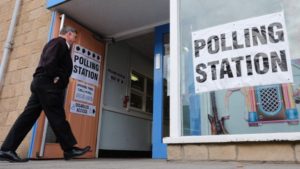
Voting is under way in a historic referendum on whether the UK should remain a member of the European Union or leave.
A record 46,499,537 people are entitled to take part, according to provisional figures from the Electoral Commission.
Polling stations opened at 07:00 BST and will close at 22:00 BST.
It is only the third nationwide referendum in UK history and comes after a four-month battle for votes between the Leave and Remain campaigns.
In common with other broadcasters, the BBC is limited in what it can report while polls are open but you can follow the results as they come in across the BBC after polls close on Thursday evening.
The referendum ballot paper asks the following question: “Should the United Kingdom remain a member of the European Union or leave the European Union?”
Whichever side gets more than half of all votes cast is considered to have won.
The weather forecast for polling day is mixed.
There have been thunderstorms in London and south-east England which caused flooding overnight.

Sunshine and heavy showers are forecast for Northern Ireland and Scotland but it is set to be drier and brighter elsewhere.
After the referendum polls close, sealed ballot boxes will be collected and transported to the count venue for each of the 382 local counting areas.
These represent all 380 local government areas in England, Scotland and Wales, plus one each for Northern Ireland and Gibraltar.
Results from these areas will then be declared throughout the night, along with result totals from 11 nations and regions.
Depending on how close the poll is, the result may become clear before the final national result is officially declared by the Chief Counting Officer, who will be based at Manchester Town Hall.
The Electoral Commission estimates a final result “around breakfast time” on Friday.
The last nationwide referendum took place five years ago, when voters rejected an attempt to change the way MPs are elected.
The first one was in 1975, when the country was asked whether the UK should continue to be a member of what was then called the European Economic Community.
SOURCE: BBC
